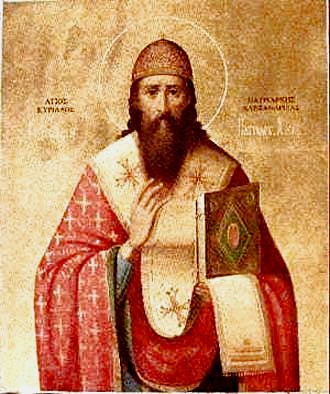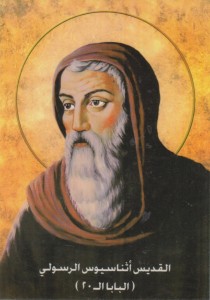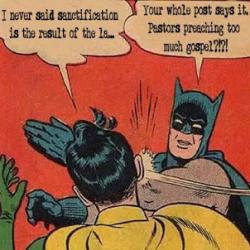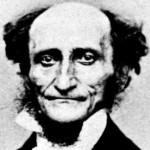
[The following essay has been excerpted from personal correspondence and was originally posted at Pseudepigrapha: Deniable Plausibility as part of the “Dear Robert” series.]
Dear Robert,
It is most important that I begin by saying that I am but a seminarian and am by no means an authority or a great theologian. However, I am able to express the position of the historic Lutheran church on matters such as Justification as I have understood them from my readings of the Fathers (both Patristic and Lutheran) and from the lectures of eminent Lutheran scholars here on campus.
I must also admit that I am not much of a “scholastic”, and so I often write with a bit of imprecision. With that said, I hope you can discern the spirit of my words and that you will not hold any semantic inconsistencies against me.
You wrote that, according to the Reformed theology which you have inherited, you have understood Justification as being an attribution of Christ’s righteousness to the sinner, the concept of it being merely an attribution — that is, that some attribute, some nominal predicate, is being connected to the sinner which does not properly belong to him. But why is it merely attributed to him, rather than being truly his?
It is my impression that the Reformed tend vigorously to defend the complete transcendence of God. If God is truly to be “that which nothing greater can be conceived,” if He is to be the “unknowable, infinite, ineffable God,” then He must be infinitely separated from creation, for the distance between any finite thing and any infinite thing is infinite. This is a very rational argument, and there is indeed much good piety to be procured from a consideration of God’s transcendence. However, I believe the Calvinists abuse this doctrine by using it to deny the central mystery of Christianity: that this very infinite and transcendent God has become entirely immanent, that is, that He has united Himself with His creation in man, and that He has done so essentially (that is, at the level of his essence).
The most startling way in which Calvinism realizes this separation of the transcendent Creator and the created is in a denial of any real communication between the two natures of Christ. To Calvinists, the hypostatic union between the human and the divine natures in Christ is little more than verbal. This being so, there is surely nothing “deified” about the nature of man in Christ, for human nature is incapable of interacting with the infinite Divine nature in any way. Similarly, the Divine is in no way bound to the human nature of Christ. The two, though in some sense “combined” in Christ, do not in any way communicate their attributes to each other. They are as two boards, glued to one another; connected by a certain tie, but utterly distinct. Theodore Beza writes:
To posit any communication that is an effect of the union and other than the actual and usual uniting that they call ‘grace’, I say, that is nothing other than intolerable Eutychianism (Resp. ad. act. Colloq., p.92).
Similarly, he writes:
We teach on the basis of the hypostatic definition of the union that neither the deity nor the properties of the deity can be said about the humanity in any way, not even in the union (ibid).
Elsewhere he again writes:
We call the communication of properties ‘verbal’ insofar as this is a figurative expression of speech. Yet at the same time we call it ‘real’ and ‘utterly true’ because it is said about the entire person against Nestorius, according as it is one. But if they are said about the natures, as our adversaries take this, we claim that it is neither verbal nor real, but blasphemy, something to be hated (Opera, vol. 1, p. 638).
What Beza seeks to make clear here is a teaching found already in the Institutes of Jean Calvin, that the divine and human are unbridgeably separated, not because of sin, but by nature — that is to say, even in the state of grace before the fall, there was an infinite chasm between Adam and God.
If to the Reformed there is a separation between the divine and human in the hypostatic union of Jesus himself, it is needless to say that there is an insurmountable divide between humanity in general and God. Because of this, to the Calvinist the goal of Justification is not to be in any real sense “returned to God” but rather just to be in a “right relation” to Him, in the same way that two friends can be put into a right relation. Since Calvinists see the problem to be relational and not ontological, they posit a solution which is relational and not ontological, namely, that God decides to accept the death of one man, Jesus, as a propitiation for the sin of all man, thereby forgiving the elect their sin, and granting them His favor.
The important thing to note about the entire Calvinist system is how much it relies on “decisions” by God, that is, on God’s will, and not on His essence. He decides to save man, and then decides which particular men to save (Limited Atonement) and then decides on a plan to save mankind (the salvation narrative) and then decides to accept Christ’s death as an atonement, though in and of itself it was of no particular value. God decides to forgive the elect, and since it is merely a decision on behalf of God, it need not have any “objective” substance. In a sense, it is very subjective, for it all occurs within the mind of God. This leads to Calvinism’s famous theology of “decrees” whereby all things pertaining to salvation happen primarily by God’s decreeing from His infinite holiness that it come to pass.
 Lutherans differ here, for they would agree with St. Cyril of Alexandria that man was meant from the beginning to have a true, essential communion with God. It is for this reason that St. Peter writes that we will be “partakers of the divine nature” and the Psalmist that “Ye are gods, all of you are children of the most high!” Similarly, the language of adoption assumes an essential union between the adopter and the adopted, for a man can only adopt that which is another man; if a son is to be a son of a father, he must be like unto the father. The image of “family” employed in any way assumes a kinship. Therefore, if we are to be adopted by God, becoming sons of the Father, and the brothers of Christ, we must be likened unto God, or as Paul writes, we must be “transformed into the same image, from glory to glory.”
Lutherans differ here, for they would agree with St. Cyril of Alexandria that man was meant from the beginning to have a true, essential communion with God. It is for this reason that St. Peter writes that we will be “partakers of the divine nature” and the Psalmist that “Ye are gods, all of you are children of the most high!” Similarly, the language of adoption assumes an essential union between the adopter and the adopted, for a man can only adopt that which is another man; if a son is to be a son of a father, he must be like unto the father. The image of “family” employed in any way assumes a kinship. Therefore, if we are to be adopted by God, becoming sons of the Father, and the brothers of Christ, we must be likened unto God, or as Paul writes, we must be “transformed into the same image, from glory to glory.”
It is also not to be taken lightly that the communion between God and the Church is likened in the Scriptures to a bridegroom and his bride. God is not distant from His Church, neither does He merely “relate to it.” Rather, just as a bridegroom desires to unite with his wife, so does God long to unite with His Church. God’s love for the church is erotic, that is, He longs to pour Himself into His Church, to pour His being into mankind. It should not seem strange, therefore, that St. Ignatius, in his Epistle to the Romans, refers to Jesus as ‘Eros’ that is, a passionate love.
God, therefore, longs to bring mankind into Himself, not in such a way that man is “merged into” God, but in such a way that man and God might be said to be one, though they are also said to be distinct. Man must be deified. But some problems lie in the way, namely: that man has severed his nature from God’s love, and has instead devoted himself to the devil and all the powers of the demonic. Fallen man is not only separated from God ontologically, then, but he actively hates God and serves Satan. How then, can he be saved?
In the Incarnation, Christ once again reunites the human nature to the Divine in Himself. The Reformed tend to think that the Incarnation means that the Son “became a man.” But note that the Nicene Creed reads that the Son “became man,” that is, humanity. In Him, the schism between the Divine and the human which was wrought by man’s rebellion was ontologically undone. By becoming mankind in this way, by uniting the two natures in His own person, He is able to conquer the devil as mankind, that is — He is able to undo the evil of Adam, not as God, but as man. Similarly, He can be put to death, and die not just as Jesus of Nazareth, but die as mankind. All man died in Jesus, and therefore God’s first promise that “if you eat of this fruit, you shall surely die” comes to pass in Him, not metaphorically, but truly.
To understand the Lutheran doctrine of “Forensic Atonement” you must first grasp the concept that Jesus was not just “God taking on flesh” but the Son taking on the human race in every respect. In some mysterious way He took on and bore all the sin of mankind within Himself, while never sinning Himself. In this sense (and in this sense only, pace Matthias Flacius) He was the greatest sinner of all. He was a murderer, a harlot, an adulterer, a thief, a backbiter, a rapist. He was all evil, and for this He was put to a terrible death. Even more so, He was not just a generic “murderer” or a generic “harlot” but He was every murderer and harlot individually. He was David, the killer and adulterer; He was Rahab, the prostitute; He was Adam, the rebel, the hater of God. He was them all, and they all received their death in Him, and so justice was wrought (cf. Great Commentary on Galatians, Blessed Martin Luther). The “account was settled” before God, for mankind had truly been punished. Jesus “bore our sorrows.” The more strongly we are able to accept the awful truth of the imputation of our sin to Christ, the closer we come to comprehending the great mystery of the religion.
But it is not just the case that the Son, being made man, was able to effect the forensic justification of mankind by dying as mankind, but rather, man has also been united to the Son, and so just as the Son is essentially eternal, so those united to him will be eternal, as well. Death cannot bind us, for we partake of undying Divinity. We therefore will “rise to new life,” passing from “glory to glory.”
So the question then becomes, how is it that we are made such partakers of the Divinity? How do we participate in the fruits of the Incarnation and Atonement of the Son? The answer is found in the ancient “economy of salvation.”
 The Father is the fount of the Divinity; it is to Him that man must be brought. The Father and the Son have an essential communion within the Trinity, and in the Incarnation, the Son takes on a human body and fills it with all the power of the Divine glory. His body therefore becomes truly life-giving. We as lowly men cannot directly commune with the Father, for — as the Reformed are quite apt to inform us — He is infinitely above us. But we can commune with flesh, for we are flesh, and so we commune with the flesh of Christ in the mysteries of the Church. By that flesh which is united to the Son we too are united to the Son, and as the Son is united to the Father, so we are then united to the Father. It is therefore by the physical Body and Blood of Christ that we are found to be born unto the Father’s glory, and without this Body and Blood, there can be no union, and therefore no Christian religion. It is with this understanding that the Lutheran is glad to affirm St. Athanasius’s dictum, “God became man that man might become God.”
The Father is the fount of the Divinity; it is to Him that man must be brought. The Father and the Son have an essential communion within the Trinity, and in the Incarnation, the Son takes on a human body and fills it with all the power of the Divine glory. His body therefore becomes truly life-giving. We as lowly men cannot directly commune with the Father, for — as the Reformed are quite apt to inform us — He is infinitely above us. But we can commune with flesh, for we are flesh, and so we commune with the flesh of Christ in the mysteries of the Church. By that flesh which is united to the Son we too are united to the Son, and as the Son is united to the Father, so we are then united to the Father. It is therefore by the physical Body and Blood of Christ that we are found to be born unto the Father’s glory, and without this Body and Blood, there can be no union, and therefore no Christian religion. It is with this understanding that the Lutheran is glad to affirm St. Athanasius’s dictum, “God became man that man might become God.”
Now that I look back at what I have written, I realize it is terribly unorganized. You must forgive me, for I am currently battling a very resilient flu, and am therefore not at the heights of my intellectual capacity.
Again, I am but a lowly seminarian. I would, however, be glad to answer any other questions you might have, Robert. Also, I have been informed that Jordan Cooper (an actual pastor and a well-studied theologian!) has been brought into the conversation, perhaps he can help you as well, and also perhaps correct me where I have been misled or at least unclear.
George Fields
+SDG+











